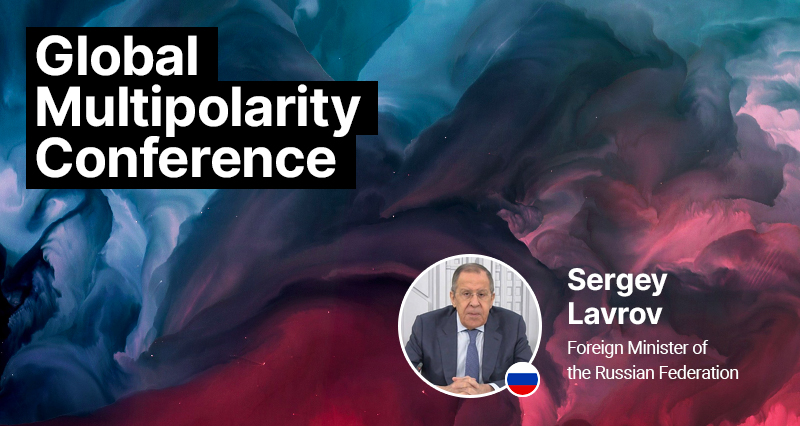The institutions Nova Resistência (Brazil), the New International Order Initiative (Türkiye), the International Eurasian Movement (Russia), the Thinkers’ Forum (China) and the International Russophile Movement organized a ‘Global Multipolarity Conference’ on April 29th, 2023.
Dozens of speakers from all over the world participated in the conference. UWI will document their presentations in the coming days.
Today we document the video address that Sergey Lavrov, Foreign Minister of the Russian Federation, sent to the congress as opening message.
Foreign Minister Sergey Lavrov’s video address to the participants and organizers of the World Online Conference on Multipolarity, Moscow, April 29, 2023
Colleagues,
I am delighted to welcome the participants and organizers of the World Online Conference on Multipolarity. I appreciate it that your forum has brought together prominent representatives of political, public and academic circles from several dozen countries from almost every continent. We welcome this kind of keen interest in a frank and depoliticized exchange of views.
The relevance of such discussions can hardly be overestimated. It is obvious that the “end of history” proclaimed after the fall of the Berlin Wall and the collapse of the USSR has not occurred. The attempts to establish a unipolar world order with a sole decision-making center in Washington have failed.
Today, the movement towards global multipolarity is a fact, a geopolitical reality. We see new global centers, primarily in Eurasia, the Asia-Pacific region, the Middle East, Africa, and Latin America, grow and achieve impressive success in various fields relying on their independence, state sovereignty and cultural and civilizational identity. At the same time, they are guided by their own national interests and pursue independent policies in domestic and foreign affairs. The last thing they want is to be held hostage to other people’s geopolitical games or do someone else’s bidding.
The facts speak for themselves. Over the past three decades, the share of the G7 countries in the global economy has significantly decreased, while the influence of emerging markets is growing steadily. China has become the world’s leading economy in terms of purchasing power parity, skillfully combining market tools with government regulation.
We are witnessing the continued transformation of the structure of international relations. A striking example of multipolar diplomacy is the work of multilateral associations of a new type such as the SCO and BRICS. They bring together member countries with different political and economic systems, with distinct values and civilizational platforms, which effectively cooperate in various fields. In fact, BRICS can be visualized as a kind of a cooperative net thrown over the old North-South and West-East dividing lines. It is no coincidence that more and more countries in the Global South are striving to establish ties with these associations or become their full members.
As President Vladimir Putin noted, “this trend towards multipolarity in the world is inevitable. It will only intensify. And those who do not understand this and do not follow this trend will lose.”
It makes perfect sense that Washington and its satellites’ efforts to reverse the course of history and make the international community live according to the “rules-based order” they invented are failing. I will mention only one of them, the Westerners’ policy to isolate Russia. But countries that constitute the world majority, which are home to about 85 percent of the global population, do not want to do the dirty job for the former colonial powers.
Friends,
In today’s multipolar world, in the face of cross-border challenges and threats, the only reasonable alternative to confrontation (those who initiate confrontations will lose, too) is to combine the efforts of key global centres on the principles of the UN Charter, including respect for the sovereign equality of states ensured in practice. Everyone needs to recognise the irreversibility of the emergence of a more equitable polycentric international system. It is in our common interest to ensure that the multipolar architecture is based not on a “balance of fear,” but on a balance of interests, on universally recognised norms of international law, and on mutually respectful dialogue between different civilisations, religions and cultures.
Russia remains at the forefront of international efforts to strengthen the multipolar, legal and democratic principles of interstate communication. To this end, we will continue our efforts at the UN, including as part of the Group of Friends in Defence of the UN Charter. We will certainly continue to closely coordinate our steps with our numerous friends, allies and countries that share our views, including our partners in the CSTO, the EAEU, the CIS, BRICS, the SCO and other regional associations of the developing world.

















Leave a Reply